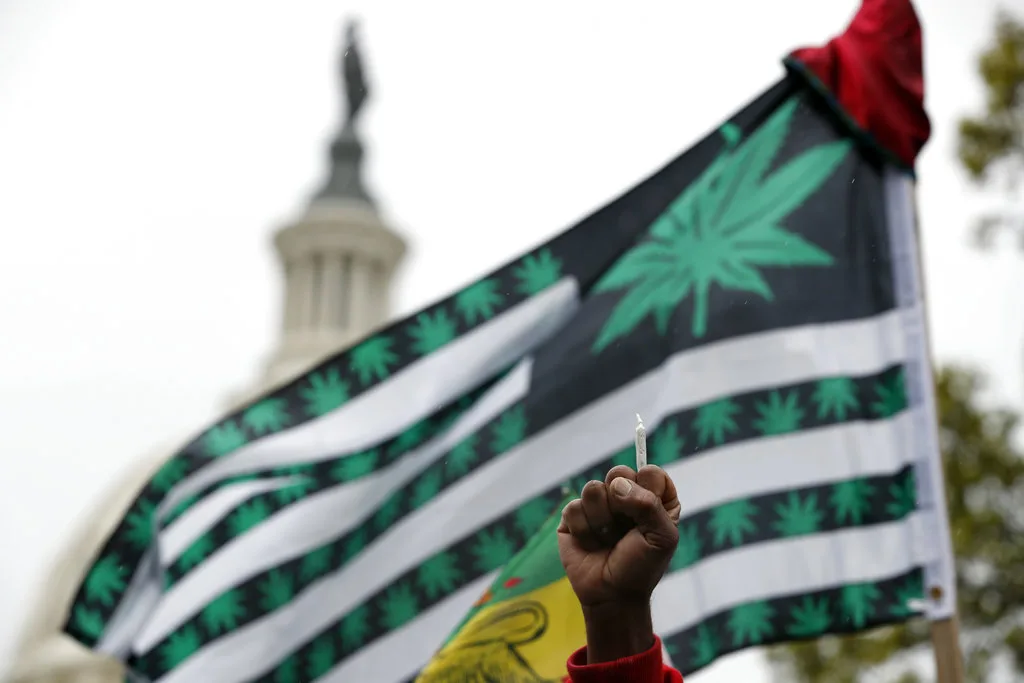
A man holds up a joint during a rally to support the legalization of marijuana on Capitol Hill, Monday, April 24, 2017 in Washington. (AP Photo/Alex Brandon)
The legislation would establish a program to cover costs of expunging low-level cannabis offenses in states where marijuana has been legalized.
A new federal proposal from US Sen. Jacky Rosen (D-Nevada) seeks to help expunge convictions related to low-level marijuana convictions in states where it has been legalized or decriminalized.
Rosen on Thursday introduced the Harnessing Opportunity by Pursuing Expungement (HOPE) Act, which, if passed, seeks to establish a new federal grant to cover the costs of the expungement or sealing of records for marijuana-related offenses.
In addition to funding the expungement and sealing of prior convictions, the grant dollars could also be used to update record-keeping technology, automate the expungement process, and support legal clinics that provide expungement assistance for ex-convicts.
“While cannabis has been regulated in our state since 2017, many Nevadans are still dealing with the effects of past low-level marijuana offenses,” Rosen said in a statement announcing the bill. “Having a record for something that is now legal in our state threatens Nevadans’ ability to get a job, apply for housing and contribute to our state’s economy.”
Currently, Nevadans with nonviolent cannabis offenses seeking relief are required to petition a judge and then have their record manually sealed in each jurisdiction throughout the state, if successful, according to The Nevada Independent.
MORE: Up In Smoke: Crónica Cannabis Party 4/20 in Sin City
Rosen is the latest federal lawmaker to introduce an iteration of the bill. A similar bill was introduced in November 2022 by Ohio Republican US Rep. David Joyce—but ultimately stalled in committee. Nevada and Ohio are among the 24 states and the District of Columbia that have legalized marijuana for recreational use.
Joyce and Rep. Alexandria Ocasio-Cortez (D-New York) on Thursday reintroduced a version of the bill in the House. The digital publication Marijuana Moment on Thursday reported Rosen’s bill could be included in a banking reform package Senate Majority Leader Chuck Schumer hopes to bring to a vote later this month to coincide with 4/20, a holiday celebrated by marijuana enthusiasts.
That package would also include another bill, the so-called SAFER Banking Act, which seeks to allow cannabis businesses to access banking, credit, and insurance services.
That list could grow before the end of the year: Initiatives are underway in Florida, Nebraska, Idaho and South Dakota to put legalization measures on the ballot for the 2024 election. A Gallup poll published in November shows 70% of US adults favor the federal legalization of cannabis.
“Removing the barriers caused by cannabis criminal records is one important step in addressing the harms caused by the nation’s flawed and misguided cannabis criminalization laws,” Riana Durrett, director of the UNLV Cannabis Policy Institute, said in a press release shared by Rosen’s office.
The bill also highlights the attitude shift from officials in Washington toward cannabis—which remains illegal federally—and its broader cultural prevalence. In August, the US Department of Health and Human Services issued a recommendation to the Drug Enforcement Agency to reclassify marijuana from a Schedule I substance (i.e. heroin, LSD) to a Schedule III drug under the Controlled Substances Act.
President Joe Biden in August 2022 also issued a blanket pardon for all federal simple marijuana offenses, which applied to thousands of people, and to date has yielded 195 certificates of pardon, according to the Justice Department.
But some advocates say more can still be done.
“As the Administration continues to review the federal classification of cannabis, we continue to call for more to be done on criminal justice reform that is outside the scope of the administrative scheduling process,” Saphira Galoob, executive director of the National Cannabis Roundtable said in Rosen’s release.
Galoob continued: “The HOPE Act will do just that by allowing federal funds to be access[ed] by local and state governments that choose to move the ball forward in their own jurisdictions by expunging records of those charged with cannabis-related conduct that is now legal under their laws.”
Politics

Video: NVSOS Report Finds Virtually Zero Fraud Linked to 2022 Election

How to apply for a job in the American Climate Corps
The Biden administration announced its plans to expand its New Deal-style American Climate Corps (ACC) green jobs training program last week. ...

Nevada Secretary of State teams up with veterans to keep elections safe
The new partnership with Vet the Vote is looking for veterans and military family members across Nevada to volunteer to help administer the 2024...
Local News

Instalan en Washington, D.C. a Nora Aguirre como presidenta nacional de NAHREP
La corredora de bienes raíces de Las Vegas, Nora Aguirre, tomó posesión como presidenta nacional de NAHREP. La experimentada líder de “realtors” de...

La Vecindad Cantina holds a ribbon cutting ceremony for its new location
Community members and dignitaries celebrated the grand opening of a new locally-owned Mexican cantina on Thursday, Mar. 14, 2024. La Vecindad...





